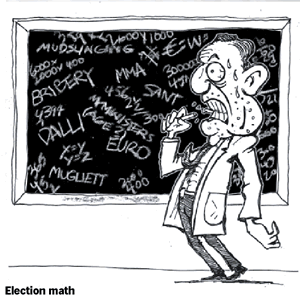 The ideological convergence of both parties to a centre of moderates is sometimes interpreted as being a manifestation of ‘realistic’ politics, the kind which invites decision-makers to look beyond political philosophy and instead get down to the brass tacks of doable policies.
The ideological convergence of both parties to a centre of moderates is sometimes interpreted as being a manifestation of ‘realistic’ politics, the kind which invites decision-makers to look beyond political philosophy and instead get down to the brass tacks of doable policies.
But this convergence has ultimately eroded much of the choices left to the electorate when it will be called upon to elect its new government. Lawrence Gonzi is menaced by the threat of fatalism – his 20-year-old Cabinet is a factor that could punish the Nationalist leader when he comes to sell off his own persona as a ‘safe pair of hands’. History would seem to be set against him, although he firmly believes economic prosperity will be his winning ticket.
And Labour looks set to present itself as a ‘fresh’ alternative, notwithstanding the same faces it presents, armed with a voluminous blueprint for governance which it hammered out in consultation with various groups. But its complacency on issues such as divorce, immigration, and hunting, cannot be ignored. Alternattiva Demokratika runs the risk of being ignored despite the respect it has enjoyed in various environmental and community campaigns, and setting the agenda on rent reform.
To the electorate however, the ideological convergence of the two main parties leaves it with a simple choice as to whom it wishes in power: it will most certainly be the person likely to be ‘a better prime minister’, a judgement which can be fraught with weakness. It will be a choice on whom the electorate trusts the most, again a value judgement that might not be based on serious considerations as to what the party is actually offering, or what it will actually do once in government.
Lawrence Gonzi has proved to be a disciplined manager of the country’s economy. But his government has lacked on issues many back in 2003 believed it would champion as the party supporting EU membership. But Gonzi's government is perceived to have become even more conservative; and many still find much to criticise in its environmental record despite being the government which has done the most on environment than other administrations.
Alfred Sant has been the easy target of Nationalist mudslinging, with his two-year record in government always one of the most favoured methods used by the PN to counter his arguments. Labour can look towards a positive year it seems, going into the elections with some renewed confidence. It can harp on the need for change, something voters are likely to find appealing. It can present new ideas and steal the limelight from the Nationalists, who have yet to make amends with what negative effects, if any, might arise in the first few months of Malta’s accession into the eurozone. And Labour has also enjoyed a lead in the polls for the greater part of the year.
But that alone shouldn’t put it at ease. The polls do change, as they did in the week following the performance of both party leaders at the Independence Day rallies, when Labour’s lead narrowed to just one per cent. The electorate, evidently, appears even more sensitive today to performance, as if it were some profound indication of how a government functions. If anything, it was an indication of the fickleness of politics when people don’t look beyond the media and TV spin.
When parties are interested only in pushing their leaders as the focal point of a successful government and a more prosperous country, rather than taking head-on issues which are not necessarily popular – such as immigration, the hunting conundrum, and even divorce, electoral reform or party financing – the voters respond by voting according to their TV performance, rhetorical bravado, and the spin that will be most certainly generated in the coming election. Hardly the kind of leaders we need.
In no manner should we overstate that, if a change in ideas has really occurred in the Maltese electorate, this resonates with Labour’s programme. This election is being squarely fought over whom to trust with the country’s ongoing development. And the faster the election heads into this direction, the more the electorate will be scrutinising leaders’ personalities and their records: Gonzi with his lacklustre record over quick decision-making or shortcomings of his Cabinet team; Sant with his prospectus of lost elections and his unsatisfactory two-year stint.
But it is also the two main parties which need to modernise and be braver about the ‘unmentionable’ issues, as this newspaper describes them in this special edition for 2008. Whatever fortunes this year will bring to any of the two future prime ministers, they should exploit their status to present radical policies to the electorate and tackle the thorny subjects once and for all.
Labour may be an effective opposition, but it must convince the people it is an alternative government, one with a costed and philosophically coherent electorate programme. For Gonzi, it will be his ability to guarantee years of serene and even more prosperous fortunes to the people. In either case, they will not be just selling their programmes: they will be battling to be believed.


 The ideological convergence of both parties to a centre of moderates is sometimes interpreted as being a manifestation of ‘realistic’ politics, the kind which invites decision-makers to look beyond political philosophy and instead get down to the brass tacks of doable policies.
The ideological convergence of both parties to a centre of moderates is sometimes interpreted as being a manifestation of ‘realistic’ politics, the kind which invites decision-makers to look beyond political philosophy and instead get down to the brass tacks of doable policies.